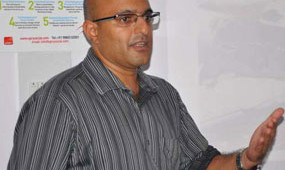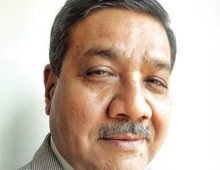 The build up to the state assembly elections in Karnataka this year and the national elections to Lok Sabha in 2014 truly started with Rahul Gandhi accepting to play a greater role at the Congress convention in Jaipur in January 2013. There is anticipation in the air of these elections influencing the direction Bangalore and India could take in the coming years.
The build up to the state assembly elections in Karnataka this year and the national elections to Lok Sabha in 2014 truly started with Rahul Gandhi accepting to play a greater role at the Congress convention in Jaipur in January 2013. There is anticipation in the air of these elections influencing the direction Bangalore and India could take in the coming years.
Seizing the moment, Infosys Chairman Mr. Narayana Murthy spelt out his wish list for political parties during his keynote at the inaugural of the Bangalore Political Action Committee (BPAC – http://www.bpac.in/) recently.
Mr. Murthy is the chief mentor of BPAC which aims to provide leadership and finance to candidates contesting in the coming assembly elections in Karnataka. BPAC believes that the middle class in Bangalore, if galvanized well, can swing results in 28 seats in Bangalore thereby influencing the way Bangalore is governed.
BPAC is a serious attempt at containing the erosion of governance standards of Bangalore city. Unlike previous initiatives with nearly the same cause, this one seems better institutionalized – enough funds to run the organization for five years – and is led by Bangalore’s stars such as Kiran Mazumdar-Shaw, founder, chairman and managing director of Biocon, T. V. Mohandas Pai, chairman of Manipal Global Education Service and K. Jairaj, former commissioner of Bangalore. BPAC is planning to rope in young leaders to connect with the youth voters. Here’s the transcript of Mr. Murthy’s keynote:
This committee (BPAC) is apolitical; it is secular and has the best interests of Bangalore and hopefully Karnataka at some stage. It’s a much needed effort to make our public governing system purposeful, efficient and effective. One of the important roles that we will have to play is to be a friendly and gentle persuader of the existing parties and the legislators and the parliamentarians, who come into power or into the parliament or assemblies in the coming years, to transform the existing political party system and themselves. Unless we can see a transformation in the well-entrenched political system, the effectiveness of BPAC may not be as much as you and I would aspire.
So what kind of political parties, legislators and parliamentarians do I deem to see in my country? This initiative of BPAC has come at the right time. For the first time in the history of India in the last 100 years, India has received the attention of the world; we occupy the high table in several multilateral forums. India is expected to be one of the leaders for spurring the economic growth in the world today. Our middle class is growing. From a paltry 15 days’ supply of foreign exchange in 1991; we today have more than 300 billion dollars in foreign exchange reserves.
Our youngsters from software, pharmaceutical, financial services industry literally walk on water today. The urban youth are full of confidence; this is one side of the story. However, there is another India where the story is very challenging. More than 400 million people live than less than 1 dollar a day. We have the largest mass of illiterates in the world; our primary healthcare system is awfully inadequate.
Signs of optimism, not helplessness
Most cities have fast growing slums, more than 50 percent of rural schools have just one teacher for every two classes, and corruption has indeed become the norm for the common man. These are very depressing data points. Yes, for the first time in my life of 66 years, I see confidence around me that we can indeed solve the problem of poverty. I do not see the same sense of helplessness in solving problems of the country as I used to see when I was in my 20s. The power of entrepreneurship has been discovered by the young, the term inclusive growth has indeed gained currency.
Manifesto for parties
What are the attributes of political parties, legislators and parliamentarians needed to make this dream a reality? Let’s remember one thing, no amount of such congregations will have any impact unless our political leaders are gently, affectionately and in a very courteous manner persuaded to transform themselves and their parties. First we need political parties to have a powerful, central and aspirational vision, such a vision should make every member of the party enthusiastic and clear about what needs to be done.
To me such a vision for a model party would be making our private sector most competitive in the world and second making the public governing system the fairest, the most transparent, most efficient, most effective and most accountable. In other words, if every legislator, if every politician were to say my party wants to make the private sector into a most competitive, public governing system, fairest, most honorable in the world, then I do believe that we will see change.
The manifesto of the political party that is produced before the election would preserve the vision and be translatable to objective, measurable actions. We want our political parties to have integrity of ideas and action whether they are in power or not, such integrity as you all know raises the credibility of our political parties. We want our political parties to institutionalize the structures, processes, decision making, succession plans, based on meritocracy. We want our political parties to choose candidates based on competence, honesty, capacity to do work and good values. We want our parties to institute legal, open and transparent systems for fund raising and fund utilization. They should produce publicly available, audited financial statements at the end of the financial year.
With such a system I believe we need not place any restrictions on how much money can be raised or spent by a party in an election. We want our parties to create institutions to teach election candidates’ basic ideas in leadership, in development economics, finance, international trade, and project management, team work, cross cultural negotiations, history and heritage of India. We want our parties to quickly evolve a code of conduct for the conduct of members of the Lok Sabha and the state assembly. I am sure all of you know that even after 66 years of freedom there is no code of conduct for members of the Lok Sabha and state assemblies. We want our parties to nominate candidates early so that voters in the constituency know who their candidate is well in advance.
What attributes would I like to see in our legislators and politicians? First of all I would like them to be role models in competence, honesty, decency, objectivity, hard work, commitment and national pride. They should spend at least 50 percent of their time in their local constituency, create an office there, meet their constituents and deal with the issues of the constituency. They should show respect and sympathy for the voters of their constituency whether they voted for them or not. They should avoid conflict of interest in their work; they should declare their personal and business interests and keep out of committees and chairmanship of government bodies where there could be a potential conflict of interest.
We want them to declare their personal wealth every year as well as full financial and positional details of their relatives’ like spouse, parents, children, grand children and siblings. Every year, they should publish their accomplishments with specific, verifiable and objective, measurable data. When they are members of the legislature, each member should specialize in a couple of areas of expertise. Build a research team to help understand these issues, formulate policy and introduce legislations. The government should provide full financial support for such research officers.
If BPAC can indeed take this as one of their important agenda, I believe that we will move a long way. BPAC may have to coordinate with other such efforts in different parts of the country because I am convinced that starting new institutions are good but unless we can transform our existing institutions for the betterment of the country we may not be able to achieve as much as we want.











Recent Comments